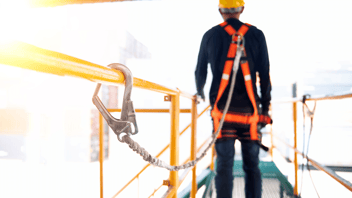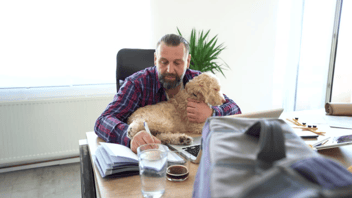As someone who’s in a position of leadership and is responsible for the safety of others, it’s crucial to be fully rested and alert when you show up to work in the morning. According to the National Sleep Foundation, individuals who are even moderately sleep-deprived have a 50% slower response time than somebody under the influence of alcohol. Not only does a lack of sleep reduce a person’s response time, but it also slows down work production. A study by the Sleep Research Society found that those who get 7-8 hours of sleep per night are 20% more productive than people who only got 5-6 hours. Accordingly, if you want to excel in your position and ensure everything runs safely and efficiently, make sure you’re getting the allotted 7-9 hours of sleep a night.
Here are a few sleep tips you can use to ensure your employees wake up feeling alert and ready to take on the challenges of your upcoming workday. If you have an employee wellness program you should include some of these tips as best practices right off the bat.
Start A Nighttime Routine
Incorporating a routine into your nighttime schedule is an ideal way for your body and mind to unwind and get ready for a full 7-9 hours of sleep. After brushing your teeth and locking up the house, try experimenting with a few different activities to see which ones work for you. Here are just a few ideas.
-
Set A Bedtime - When you go to bed at the same time every night, your body gets into a routine and begins to recognize it’s time for bed when that time approaches.
-
Read a Book - Studies have shown that 6 minutes of reading every day can reduce stress levels up to 68%, which can help you fall asleep faster. Reading also contributes to sleepiness as your eyes become more tired after constant left to right movement across the pages.
-
Practice Yoga or Meditation - Gentle stretching before bed can help relax both your body and mind. It stretches out your muscles after a long day at work and promotes mindfulness by teaching you to focus on your breath instead of work-related stresses.
-
Take a Bath - Instead of taking a pre-bed shower, try taking a bath instead so you feel more relaxed.
-
Start a Journal - Maybe if reading isn’t your forte, take up journal writing instead. You can use it to explore your creativity before bed or to release your stressful thoughts onto paper before they marinate in your brain and prevent you from falling asleep.
Ensure You’re Sleeping On The Proper Mattress
A mattress can either make you sleep like a baby, or hinder you from sleep so you’re left tossing and turning all night. That’s why you need to make sure your mattress is accommodating to both your body type and sleeper type. Back and stomach sleepers should consider a firmer mattress so their spines remain in proper alignment, while side sleepers should look on the other side of the spectrum to a soft mattress. Heavier sleepers should also take their body type into consideration. If you weigh over 250 pounds, you may want to purchase a hybrid mattress containing both spring and foam so your bed is long-lasting and you feel properly supported.
Keep Electronics Off, Unplugged, And Out Of Sight
Electronics are one of the biggest contributors to poor sleep and can make it harder for your body to recognize it’s bedtime. The light from electronic devices like your mobile phone, television, and laptop can mess with your circadian rhythm, your body’s “internal clock” that is influenced by light and darkness and in charge of regulating your sleep-wake cycle. It also inhibits the production of melatonin, the natural chemical in your body which promotes sleep. Although it might be tough, stay off your phone and TV an hour to an hour and a half before bed. Also, unplug or at least turnoff light omitting electronics such as your alarm clock or gaming consoles.
Set Up Your Sleep Environment So It’s Ideal For Sleep
Similar to how it’s difficult to get work done if you aren’t in a safe and professional environment, it’s hard to get any sleep if you aren’t in a suitable sleep environment. First things first, make sure your room is clean so you don’t feel anxious walking into a messy bedroom. You should also make sure all the lights are turned off, and windows are closed so you aren’t subjected to external noise like car horns or sirens. Lastly, make sure your bedroom is the optimal temperature for sleep — especially if you’re a hot sleeper because it can be really difficult to fall asleep after waking up drenched in your own sweat. According to experts, the ideal temperature for sleep is somewhere between 67-73 degrees.
Don’t Consume Caffeine Late In The Day
Caffeine enables coffee drinkers to get through their day with a burst of energy, and therefore, should be avoided at later times to make sure it doesn’t interfere with your sleep. Make sure you drink your last cup of coffee before 2 p.m., or about seven hours before you plan on retiring for the night.
Get Enough Exercise During The Day
One sure-fire way to make sure you get enough rest at night is to get enough exercise during the day. You might feel unmotivated to work out early in the morning before your job or after you get off, but only 30 minutes of exercise a day can really benefit your sleep and overall health. One study found that adults who engaged in daily exercise cut the amount of time it took to fall asleep in half, and they even slept an extra 41 more minutes at night. That extra 40 minutes or so could be the difference between you feeling alert, or feeling a little groggy.
Avoid Food And Or Alcohol Before Bed
Drinking liquids before bed can be disruptive to sleep, especially if it's an alcoholic beverage. Food can also hinder you from sleep by limiting your natural release of HGH and melatonin, or by causing indigestion. This means you should avoid late-night snacking at all costs, and make sure you eat dinner at least two to three hours before you start your bedtime routine.
McKenzie Dillon is a blogger and sleep enthusiast for The Slumber Yard, a review site that focuses on bedding products. When she’s not sleeping, McKenzie likes attending comedy shows, hiking, and cooking.






Leave a Comment